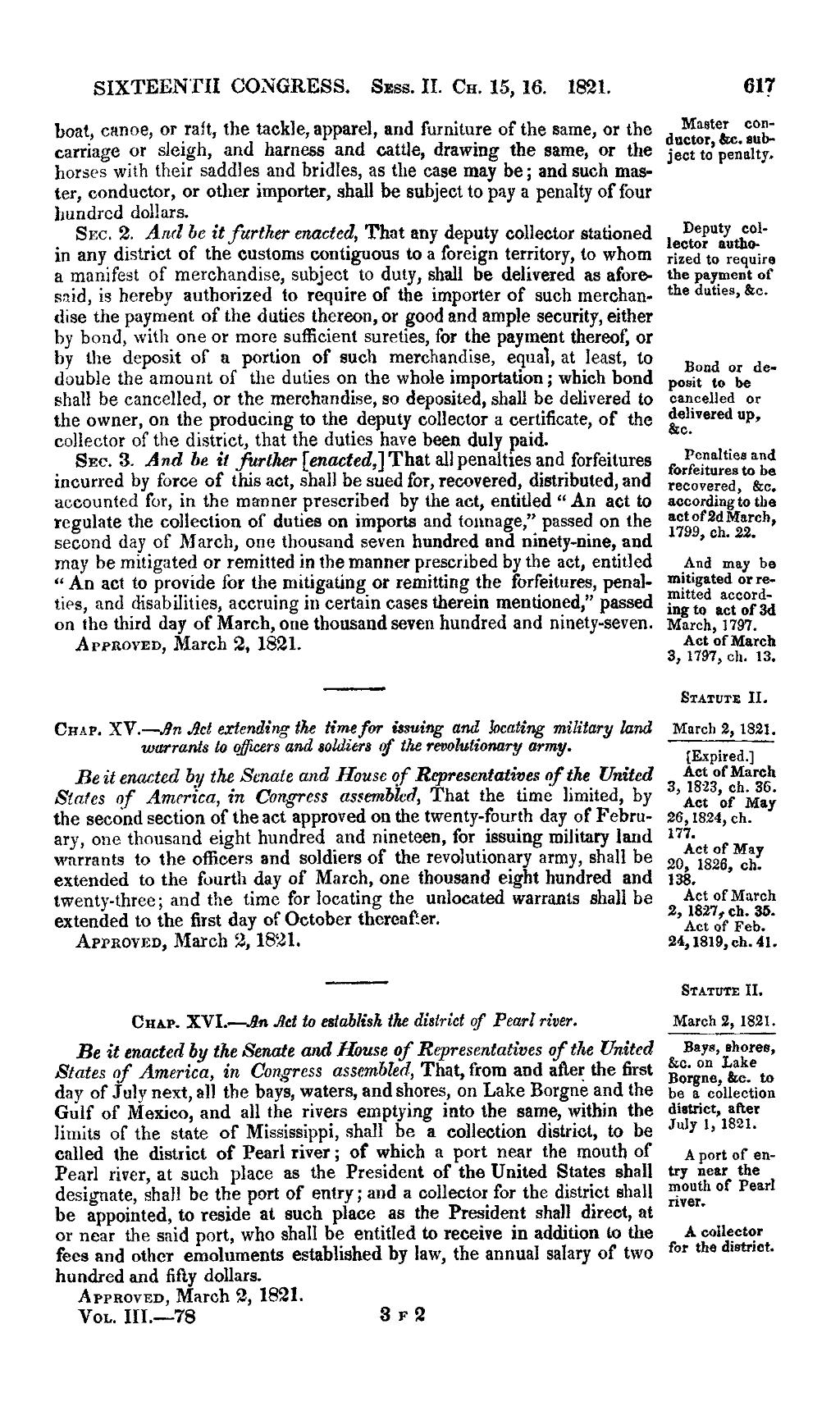Master conductor, &c. subject to penalty.boat, canoe, or raft, the tackle, apparel, and furniture of the same, or the carriage or sleigh, and harness and cattle, drawing the same, or the horses with their saddles and bridles, as the case may be; and such master, conductor, or other importer, shall be subject to pay a penalty of four hundred dollars.
Deputy collector authorized to require the payment of the duties, &c.
Bond or deposit to be cancelled or delivered up, &c.Sec. 2. And be it further enacted, That any deputy collector stationed in any district of the customs contiguous to a foreign territory, to whom a manifest of merchandise, subject to duty, shall be delivered as aforesaid, is hereby authorized to require of the importer of such merchandise the payment of the duties thereon, or good and ample security, either by bond, with one or more sufficient sureties, for the payment thereof, or by the deposit of a portion of such merchandise, equal, at least, to double the amount of the duties on the whole importation; which bond shall be cancelled, or the merchandise, so deposited, shall be delivered to the owner, on the producing to the deputy collector a certificate, of the collector of the district, that the duties have been duly paid.
Penalties and forfeitures to be recovered, &c. according to the act of 2d March, 1799, ch. 22.
And may be mitigated or remitted according to the act of 3d March, 1797.
Act of March 3, 1797, ch. 13.Sec. 3. And be it further [enacted], That all penalties and forfeitures incurred by force of this act, shall be sued for, recovered, distributed, and accounted for, in the manner prescribed by the act, entitled “An act to regulate the collection of duties on imports and tonnage,” passed on the second day of March, one thousand seven hundred and ninety-nine, and may be mitigated or remitted in the manner prescribed by the act, entitled “An act to provide for the mitigating or remitting the forfeitures, penalties, and disabilities, accruing in certain cases therein mentioned,” passed on the third day of March, one thousand seven hundred and ninety-seven.
Approved, March 2, 1821.
Statute II.
[Expired.]
Chap. XV.—An Act extending the time for issuing and locating military land warrants to officers and soldiers of the revolutionary army.
Act of March 3, 1823, ch. 36.
Act of May 26, 1824, ch. 177.
Act of May 20, 1826, ch. 138.
Act of March 2, 1827, ch. 35.
Act of Feb. 24, 1819, ch. 41.Be it enacted by the Senate and House of Representatives of the United States of America in Congress assembled, That the time limited, by the second section of the act approved on the twenty-fourth day of February, one thousand eight hundred and nineteen, for issuing military land warrants to the officers and soldiers of the revolutionary army, shall be extended to the fourth day of March, one thousand eight hundred and twenty-three; and the time for locating the unlocated warrants shall be extended to the first day of October thereafter.
Approved, March 2, 1821.
Statute II.
Chap. XVI.—An Act to establish the district of Pearl river.
Bays, shores, &c. on Lake Borgne, &c. to be a collection district, after July 1, 1821.
A port of entry near the mouth of Pearl river.
A collector for the district.Be it enacted by the Senate and House of Representatives of the United States of America in Congress assembled, That from and after the first day of July next, all the bays, waters, and shores, on Lake Borgne and the Gulf of Mexico, and all the rivers emptying into the same, within the limits of the state of Mississippi, shall be a collection district, to be called the district of Pearl river; of which a port near the mouth of Pearl river, at such place as the President of the United States shall designate, shall be the port of entry; and a collector for the district shall be appointed, to reside at such place as the President shall direct, at or near the said port, who shall be entitled to receive in addition to the fees and other emoluments established by law, the annual salary of two hundred and fifty dollars.
